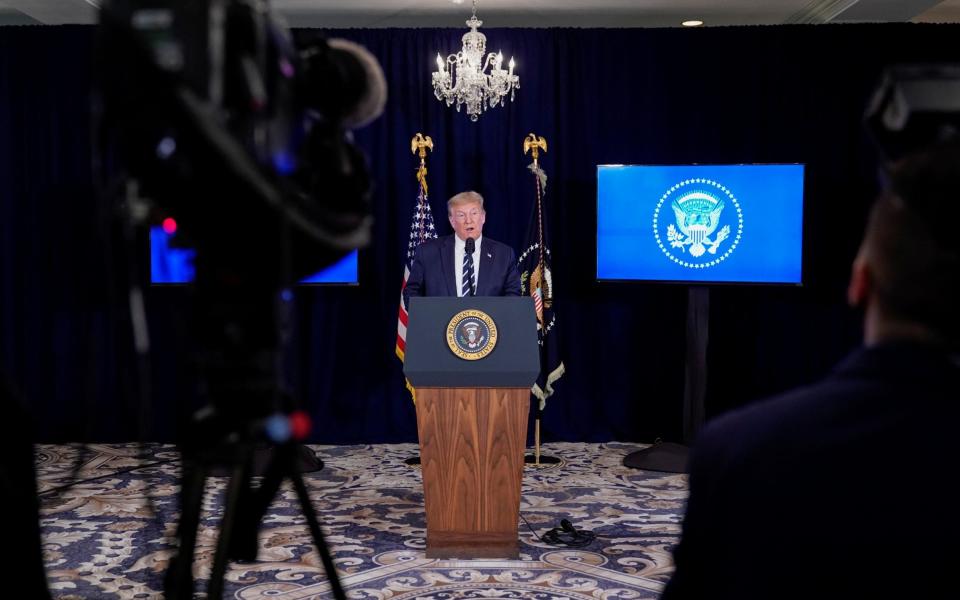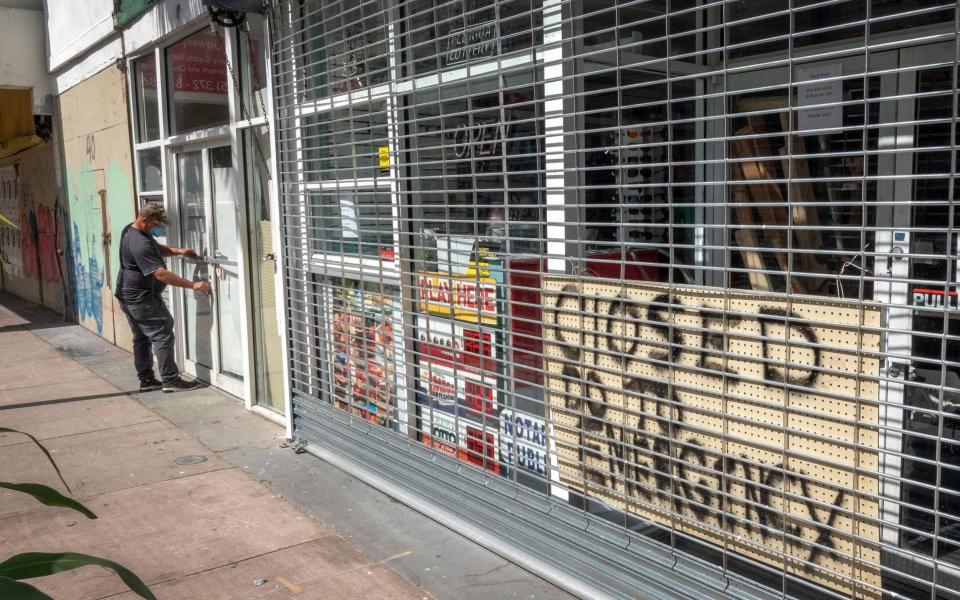Donald Trump says he will extend unemployment benefits and coronavirus aid until the end of the year

President Donald Trump said he will use an executive order to extend unemployment benefits until the end of the year.
The president said he would also consider continuing other coronavirus aid if no deal can be reached with Democrats on a new spending bill.
Congress is locked in a bipartisan row over another stimulus bill and a package of measures to help the American economy which has been ransacked by the Covid-19 outbreak. A last-ditch effort by Democrats to revive talks collapsed on Friday, making it increasingly likely that Washington gridlock will mean more hardship for millions of people who are losing enhanced jobless benefits.
The White House had rejected an offer by House Speaker Nancy Pelosi to curb Democratic demands by about $1 trillion but Mr Trump said he could issue executive orders if he is unable to reach a broad agreement with Congress.
The president told reporters on Friday that he would be working over the next couple of weeks on an executive order to require health insurers to cover pre-existing conditions and that his administration is "talking about" deferring the payroll tax, as well as continuing a moratorium on evictions. Mr Trump also said he was considering deferring student loan payments until the end of the year.

It is unclear how the president might be able to do those things unilaterally, particularly extending expanded unemployment benefits. In addition, he did not specify at what amount the expanded benefits would continue.
"What we're talking about is deferring the payroll tax for a period of months until the end of the year and I can extend it at a certain period," Mr Trump said, adding that it would be retroactive until July 1.
"If Democrats continue to hold this critical relief hostage I will act under my authority as president to get Americans the relief they need."
Mr Trump's announcement included an apparent U-turn on health insurance policy. Insurance companies were prohibited from denying coverage to people with pre-existing conditions under the Affordable Care Act passed under former President Barack Obama, known as Obamacare, which the Trump administration has tried to scrap.
But Mr Trump said: "Over the next two weeks I'll be pursuing a major executive order requiring health insurance companies to cover all pre-existing conditions for all customers."

The president, who was speaking at a news conference at his golf property in Bedminster, New Jersey, gave no details about his plan.
Mr Trump has criticised the cost and coverage under Obamacare and has been promising since his 2016 campaign to replace it with a better plan.
His administration asked the Supreme Court in June to invalidate the Obamacare law.
Joe Biden, the Democratic nominee for the presidential election on November 3, has condemned Mr Trump for fighting to gut Obamacare, accusing him of threatening healthcare protections for millions of Americans in the midst of a raging pandemic.
America's jobless rate is 10.2 per cent, with an extra 10.6m Americans unemployed compared to before the pandemic.
On Friday in Washington, Trump's chief of staff, Mark Meadows, and Treasury Secretary Steven Mnuchin said there was no progress in negotiations at the Capitol with the two top Democrats in Congress, House Speaker Nancy Pelosi and Senate Democratic leader Chuck Schumer.
Friday's talks appeared to mark the end of nearly two weeks of almost daily closed-door negotiations between the four leaders, who have sought to hammer out an agreement on legislation to resume Covid-19 relief programs that expired at the end of July.
Democrats said they offered to reduce a proposed $3.4 trillion coronavirus aid package, which the House passed in May but the Senate ignored, by nearly one third if Republicans would agree to more than double their $1 trillion counteroffer but Mr Trump's negotiators turned them down.
"It was a disappointing meeting," Mr Schumer told reporters.
Both sides said they remained open to further negotiations.
"I will be back here any time to listen to new proposals," said Mr Mnuchin, who identified the roadblocks as funding for state and local governments and an extension of enhanced unemployment payments, a $600 per week lifeline for those who have lost jobs in the coronavirus crisis.
Ms Pelosi said she gave him and Mr Meadows a stern parting message: "Come back when you're ready to give us a higher number."

It is unclear how much any president could do by executive order. At his news conference, Mr Schumer said the president could not order any new money spent - as that is the power of Congress - but could only defer costs until they were eventually paid.
The US Constitution gives Congress authority over federal spending, so Mr Trump does not have the legal authority to issue executive orders determining how money should be spent on the coronavirus.
Mr Schumer placed some of the blame for the lack of progress on 20 Republicans in the Senate greatly influenced by the conservative Tea Party: "They don't want to spend the necessary dollars to help get America out of this mess. Ideology sort of blinds them."
Ms Pelosi said Democrats want the biggest possible number for reviving the expired enhanced unemployment payments. Renewing that benefit has been a leading Democratic demand.
The White House at one point suggested $400 a week in federal benefits for the unemployed, but Democrats rejected it and have refused to do a separate deal, saying they wanted a comprehensive package that also included money for state and local governments and other matters.
More than 300 US mayors this week sent a letter to Trump requesting $250 billion in direct federal aid to cities across the country. US state governors of both parties have asked Congress for another $500 billion.

 Yahoo News
Yahoo News 